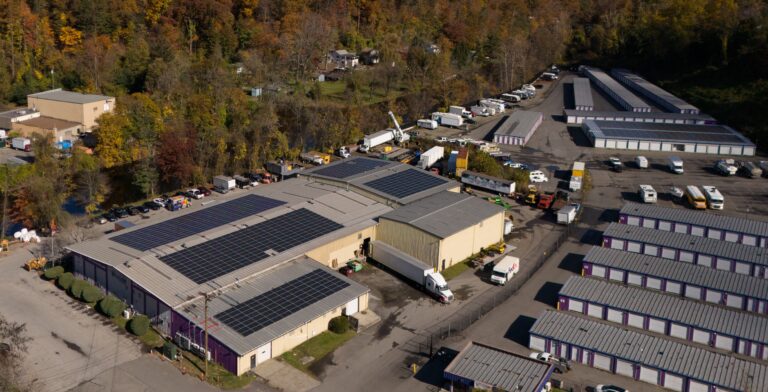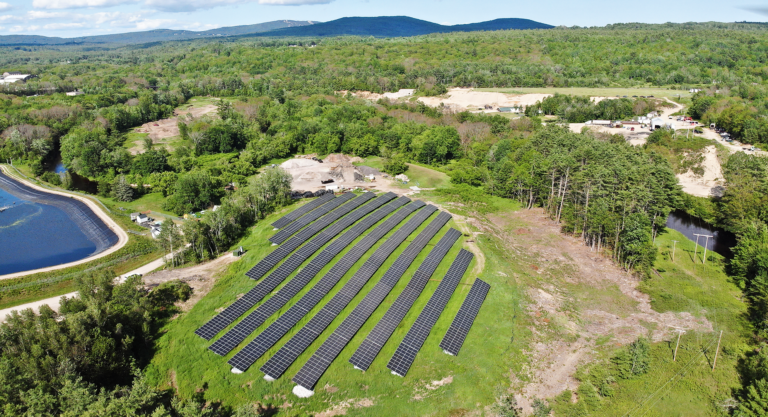If you’re looking for a job or considering a career switch, solar might just be the place for you. When people talk about solar, one of the oft-mentioned benefits of the industry is job creation. Everyone—those who love it, those who don’t—recognizes that solar is a rapidly growing industry that provides plenty of job opportunities across the country.
In the last decade alone, solar has experienced an average annual growth rate of 33%, and as of 2021, over 255,000 Americans were working in solar at more than 10,000 companies; on average, a commercial or community solar project creates 19 jobs per megawatt deployed. Wages at these companies are on par with or higher than those for workers in similar occupations. The industry is currently on a trajectory to reach 400,000 solar jobs by 2030, but if we work to meet President Biden’s goal of 100% clean electricity, that number will exceed 900,000 by 2035.
Clearly, there are plenty of jobs to be found within solar energy, but just what kinds of jobs are these? The answer may surprise you, so let’s get into it!
What Do Solar Jobs Look Like?
Many may think of technical roles like electricians and installers when considering jobs in solar energy, but the reality is that there are opportunities for individuals with diverse skill sets and interests because the industry is supported by a wide range of job functions. Here are just a few of the more common roles you can find:
- Marketing professionals: With all this growth, solar has become a competitive industry, so companies need marketing teams to help them stand out to potential clients.
- Originators: What’s a company without customers? Originators (or sales representatives, depending on the solar company’s business model) generate leads and work to turn them into new projects for companies.
- Engineers: Before solar projects can be built, they need to be designed! And that’s where the engineers enter the picture.
- Development managers and project developers: People in development work to get everything ready—securing land rights, interconnection rights, building permits, and property tax agreements—for a project to be built.
- Project managers and construction managers: Deployment of a solar project can be complicated, so managers oversee construction and ensure that everything is running smoothly.
- Solar electricians, installers, and technicians: Though slightly different in practice, these jobs are all involved in on-site installations of solar panels and solar batteries, as well as the troubleshooting or commissioning of the technology post-install. These professions will be in high demand in years to come as Rewiring America, an electrification non-profit, predicts we will need one million more electricians to make updates to help the US meet its goal of 100% decarbonized electricity by 2035.
- Financial analysts and accountants: Every company needs help with numbers, so this is the perfect role for those with a background in finance and interest in sustainability.
- Energy attorneys: As a developing industry involving navigation of government policies, bureaucracies, and legislatures, many solar companies need the assistance of energy attorneys.
Online Trainings, Certifications, and Courses
The Inflation Reduction Act (IRA), passed by President Biden in August of last year, ambitiously invested in solutions to fight our ongoing climate crisis. In addition to incentivizing more domestic manufacturing of equipment needed for clean energy deployment, the IRA also created programs and incentives that will further boost the growth of well-paying jobs in the clean energy sector, such as incentives to hire apprentices. You can learn more about that here along with other training resources:
Solar Career Map
Use the Solar Career Map to explore 40 jobs across four industry sectors and identify more than 60 routes to advancement between them.
Solar Energy Training with Solar Energy International (SEI)
SEI offers online trainings and in-person workshops on topics covering most renewable energy sources, including solar, and they are available for students at any level. The online courses, which include video lectures, forums, and quizzes, offer a great entry point for an aspiring solar professional looking to learn more about the technology. Get started with its free online course.
Registered Apprenticeship Programs (RAPs)
The Solar Energy Industries Association (SEIA) has put together a page covering all information relating to apprenticeships in the solar industry as a resource for anyone interested in exploring, developing, or participating in a RAP.
Interstate Renewable Energy Council (IREC)
IREC is a nonprofit organization working to provide clean energy and energy efficiency for the benefit of people, the economy, and the environment. As part of its efforts, IREC offers a Clean Energy Training program for professionals in a variety of related industries. In addition, IREC recently published a brief guide that covers solar training and career development resources and describes advancement pathways that can lead to rewarding careers.
North American Board of Certified Energy Professionals (NABCEP)
NABCEP Board Certifications provide the knowledge and skills to make a career in renewable energy. The certification process is fairly rigorous and best suited to those with prior experience with electrical work. Earning a NABCEP certification is the best way to stand out as a credible and knowledgeable solar energy professional, and it can increase your earning potential by over $10,000 per year.
Opportunities at UGE
UGE is growing at a rapid pace, which means we are always looking for new, talented individuals to join us! It’s an ideal place to work alongside passionate individuals who strive to be green, be great, and have fun, and as an up-and-coming company, we prioritize maintaining close relationships within and across our teams. As a company, we are committed to fostering a diverse workforce, hiring talented individuals of all ethnicities and socioeconomic backgrounds who provide unique perspectives and change the way we work for the better. In terms of work arrangements, we offer options to work hybrid in either of our offices in NYC or Toronto, or to work fully remote if you’re based elsewhere. You can check out our careers page to get a better idea of what openings are currently available; feel free to reach out if you are interested in a position that is not currently listed.




